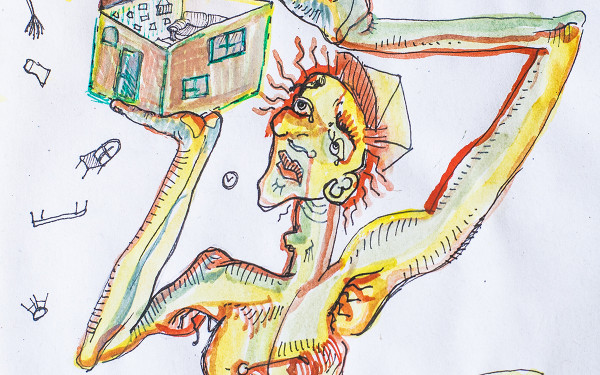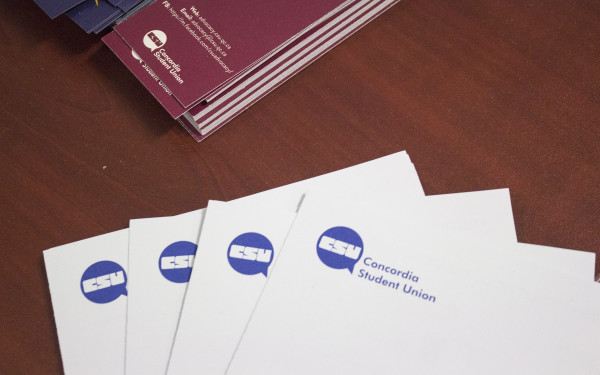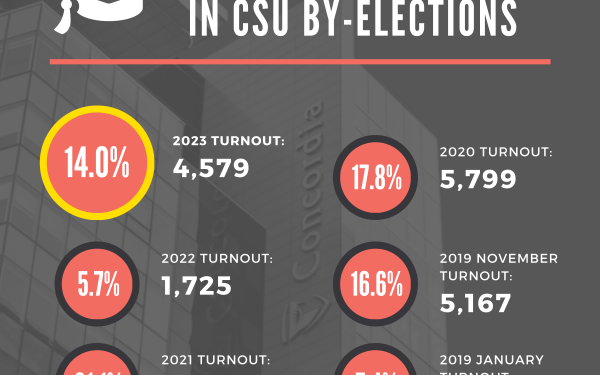What Resources Are Made Available to Concordia’s Low-Income Students?
Making It Through University on a Budget
Paul Gott knows what it’s like to be a struggling student.
In the mid-90s, he and the girlfriend he’d been living with split up, and he suddenly had nowhere to go. So, he drove his tour van—he was, and still is, the frontman of punk band The Ripcordz—to the edge of Concordia’s Loyola campus, parked it on West Broadway St., and lived there for three or four months. It was January.
“I had to register for courses, and the only ones I could get were in the morning, like the 8:30 a.m. courses,” he said. “The head of the journalism department kind of looked at me like, ‘You’ll never make those classes.’ But […] the moment that the buildings opened at seven o’clock in the morning, I was out of the van and into the lovely, warm Concordia buildings.”
At the time, Concordia didn’t have the same resources it has today—though it did have different ones. For example, there was a shower in the Bryan Building, which now forms part of the Science Pavilion.
There was one enduring aspect he identified as more important than any other—a place to go.
“The moment you register, you become part of a community, and there are all these places and things and people to help you. And it felt really good just getting back into the university. That and the fact that the university has heating.”
Even having a place to spend time, he said there are a lot of problems you run into being homeless and you need a lot of help.
“The one thing that I really loved about the university, or still do, I guess, is that there are so many resources for the students. It’s more than just food. It’s help, it’s guidance,” said Gott, now a professor in the Department of Journalism. “I try to find these and let my students know that these things are happening.”
In a landscape in which underfunding is routine and tuition and housing costs are on the rise, financial difficulties are common, but not everyone who needs assistance is aware of what’s available.
“I’ve talked to students, and I say, ‘Why don’t you go get the free meal or this or that and the other thing?’ And they go, ‘Really, that happens?’ […] Sometimes I get the feeling that everybody who knows about things are the people who don’t really need to use them,” he said.
Jane Lefebvre-Prevost, an advocate who ran on a platform of supporting low-income students in last year’s Concordia Student Union elections, said she would estimate that at least four to eight people in a 30-person classroom would be in this low-income category, though you might not be able to tell just by looking at them.
She cited generational poverty as a particular risk factor, but noted a recent survey suggesting that nearly half of Canadians are a paycheck away from financial insolvency.
Family estrangement may also be an issue for some, as parental assistance can make a big impact in terms of financial security. This is an especially common problem for LGBTQ+ students.
“When you’re trans or when you’re queer, the risk of being disowned, especially when your identity is open and public, is a very real thing that happens to a lot of people at Concordia,” she said.
While not enough to eliminate the burden of financial hardship, there are a range of resources and services on campus to help students obtain necessities or make ends meet.
“Most of them are fee-levy groups,” said Lefebvre-Prevost. These receive fee-levies from every student, then they pool those resources together to create services for low-income students.
“There’s obviously the People’s Potato,” she said, citing one of the best-known resources on campus. It’s located on the seventh floor of the Hall Building and offers vegan, by-donation meals every weekday between 12:30 p.m. and 2 p.m. during the school year. According to its website, it serves over 500 lunches daily.
“It’s a normalized service,” said Lefebvre-Prevost. “Everyone will use it—no one will shame you if they see you in the People’s Potato line.” It also has a biweekly food assistance program, which functions as a food bank. She acknowledges some people could feel insecure about using this feature, but implored students not to wait until it’s too late.
Le Frigo Vert on Mackay St. offers affordable groceries to students. It sells local produce, bulk items, and prepared foods, much of it organic. On Thursday afternoons, you can find meals, coffee, tea, and snacks available by donation. It also hosts a range of free health-related services and workshops.
Confined to Loyola campus? The Hive Café Solidarity Co-op on the second floor of the Student Centre offers a nut-free, vegan lunch at no cost between 12:30 and 1:30 p.m on weekdays. The location is not wheelchair accessible, but a meal can be brought downstairs if arrangements are made in advance.
While this service is limited to Loyola, The Hive can also be found downtown on the second floor of the Hall Building. Both locations offer a pay-it-forward service.
“Let’s say I’m someone who’s not financially struggling,” explains Isaiah Joyner, External Affairs and Mobilization Coordinator at the CSU. “I go and buy [two] coffees and I donate [one], so by paying twice as much, somebody who normally would not be able to afford that coffee [will be able to claim it]—it’s kind of like a tab, but for everybody.”
Students in dire straits can access the Student Emergency and Food Fund, administered by the Multi-Faith and Spirituality Centre on Mackay St.
“We have people that are struggling financially. [Perhaps] their paycheck is due next week but it has been delayed,” said Sai Niranjan Jyothimahalingam, the centre’s student outreach assistant. “They don’t have money for their meals.”
Appointments for short interviews are scheduled by email according to Jyothimahalingam. “We don’t ask for any proof or bank statement or anything like that. [We] just talk to them, and if [we] deem them eligible, [we] immediately give them grocery cards.”
The CSU also issues emergency food vouchers, which can be requested by contacting office@csu.qc.ca, while the Financial Aid and Awards Office, Concordia University Student Parents Centre, Campus Wellness & Support Services, Aboriginal Student Resource Centre, and the Access Centre for Students with Disabilities can distribute flex dollars for use on campus, as well as vouchers for The Hive.
Jyothimahalingam said that most of SEFF’s users are international students—a category that has lately suffered particularly onerous tuition increases, sparking protest.
Students without an established social network in Montreal are drawn to the Centre’s community spirit. Coming from India in the winter, “I’d never seen temperatures below zero ever in my life,” said Jyothimahalingam. “I couldn’t go out, I couldn’t take a walk. It was depressing. I just came [to the centre], and it felt like home.”
Those of all origins and religious backgrounds, including secular students, are welcome to drop in for free coffee or tea, social activities, meditation or even to play board games.
Jyothimahalingam hopes more students will discover the centre. “Not many students really know about it, and they regret it. ‘I just graduated and now I found out that this exists.’ I hear so many comments like this.”
“I’ve talked to students, and I say, ‘Why don’t you go get the free meal or this or that and the other thing?’ And they go, ‘Really, that happens?’ […] Sometimes I get the feeling that everybody who knows about things are the people who don’t really need to use them.” —Paul Gott
If all else fails, you may choose to do as Gott did when he was a student.
“Whenever there was anything happening in the University, I was there, eating cheese and drinking wine or coffee or whatever happened to be free,” he said.
Concordia’s online events page is an invaluable resource for discovering free campus activities, and not only for the prospect of complimentary refreshments. Recreation, health and wellness, art exhibitions and workshops are some of the free events that can be found on the calendar.
Joyner said some students may not know the resources available to them through their union. “They sometimes just don’t know what we do here.” The CSU, which represents all undergraduate students, is tasked with operating a range of core services and is involved in many aspects of student life.
Their main office is just around the corner from People’s Potato. Here, Joyner said, they distribute “menstrual products, condoms, agendas, [and] different things that we just offer for free.”
Free condoms, lube, gloves, and dental dams can also be picked up at the Centre for Gender Advocacy and Queer Concordia, both located on Mackay St. “Safe sex is the best sex, and consent is key,” said Joyner.
He added that the CSU holds clothing swaps once per semester. Clothing is collected in large bins throughout campus then made available at the CSU office. “We have a long line. People come and they just take what they need. Now you have clothes for free,” he added.
The CSU’s Legal Information Clinic is also located on the Hall Building’s seventh floor and is available to undergraduate students.
“There you can get free legal [information] for any situation that may arise for you,” said Joyner. Volunteer law students provide assistance. They can’t provide legal advice or representation, but the clinic strives to connect students to resources to meet their needs. It has a second office at Loyola campus.
The CSU also operates the Housing and Job Resource Centre, or HOJO, located on the second floor of the Hall Building, across from the Hive. They assist undergraduates who “need help dealing with their landlord, finding student housing and different resources in terms of living […] and making sure they know their rights as a tenant,” said Joyner. Similarly, it offers job search tools and can help you understand your rights as a worker, with no appointment necessary.
_900_600_90.jpg)
The Graduate Students’ Association also offers its own versions of HOJO and the Advocacy Centre, according to its website.
Students may also find jobs through the work-study program, which is offered by the Financial Aid and Awards Office to those who meet eligibility requirements.
Additionally, the CSU itself offers employment to students who are currently studying at Concordia.
Students with dependents face an especially difficult balance, and the CSU offers the CSU Daycare & Nursery downtown. It’s primarily for undergraduate students, but according to Joyner, is open to graduate students when it still has space. More enrolment information can be found on its website. Other childcare opportunities and parent resources can be found through the Concordia University Student Parents Centre.
Another major drain on students is the purchase of textbooks, but owning these can provide flexibility for low-income students.
“Personally when I was in this situation, I was working at a call centre,” said Lefebvre-Prevost. “In between calls I would have my textbooks out and I’d be trying to get as much information as I could while working.”
Joyner suggests students use Facebook groups to find used textbooks, or visit the Concordia Community Solidarity Co-op Bookstore on Bishop St., which strives for below-market prices and offers a consignment service, so students can sell books they no longer need.
Worst-case scenario, one can go to the library to access course reserves, said Joyner. Students can access course texts at Concordia’s libraries, but only for as little as three hours at a time, and the book you need may not be there when you need it. The libraries also offer technology rentals to students, including laptops and tablets and are open round the clock.
Mental health is a growing concern at universities, and a prominent issue for low-income students. “If you’re struggling to make rent, if you’re struggling between paychecks […] that is something that will inevitably affect your mental health because you’ll constantly be stressed,” said Lefebvre-Prevost.
Concordia offers counselling at both campuses through Campus Wellness & Support Services. However, appointments can require lengthy waits and are capped at 10 per student. According to Joyner, this year’s undergraduate healthcare plan will increase the annual limit for psychological services from $750 to $1000, which can be used to access off-campus psychotherapy, but each session will still require financial contribution from the student.
The Centre for Gender Advocacy on Mackay St. offers its free Peer Support and Advocacy program to everyone. The volunteers who provide one-on-one support aren’t therapists, but are trained to listen and offer peer support.
Similarly, Concordia Students’ Nightline, (514) 437-9797, is a volunteer-based listening service available by phone on Thursdays, Fridays, and Saturdays from 6 p.m. to 3 a.m.
One of the most difficult challenges facing low-income students is their profound disadvantage in tending to their academic responsibilities or joining clubs. “You can’t just create more hours in a day for a student. Everyone has 24 hours,” said Lefebvre-Prevost. Without time to manage everything, “what ends up happening is you cut out what you can, and what you end up cutting out is that study time.”
Professors may give some leeway on deadlines, but there’s a limit to what they can do. “I must admit that as a professor I find it difficult,” said Gott, “because you try and take things into account, but you also have to balance it with setting some sort of standard for all students.”
He also worries leniency could lead to students leaving his classroom without the skills required by the industry into which they’re graduating. “It’s something I tell my students. Okay, you miss a deadline in class, you miss a deadline in class. You miss a deadline at CBC, you get fired.”
Students struggling academically can access the Advocacy Centre located on the second floor of Concordia’s Hall Building.
If your GPA drops below 2.0, you need to go to a tribunal, or you need any academic support, you can go to them and make an appointment, said Joyner, and they will make sure you take the right path to academic success.
A supporter of free tuition, Gott acknowledged this is not enough, as it could still leave some students working multiple jobs just to survive. He encourages students to fully explore their bursary options.
Lefebvre-Prevost emphasized the importance of working within your limits to achieve your goals. “I would say to students who are low-income that you can take it slow; […] you can take fewer classes, you can even take a break. Do what’s best for you. Don’t try and be like your peers. Know your limits and apply those limits to your academic life.”
She encourages students who are not in this position to learn to be good listeners and to help in small ways, such as offering class notes to students who may have been working. “Not out of pity, or donating, but [by] asking and creating an equal bond.”
At times in her own undergraduate career, Lefebvre-Prevost said she didn’t take advantage of available services to the extent she could have. “I did what a lot of people who are low-income do, and that’s white-knuckling it, pretending you can support yourself on your own, that you’re independent, that you don’t need external help, because if you admit to yourself that you need help, you are admitting that you’re ‘weak.’You’re not weak.”

_900_600_90.jpg)




_600_375_90_s_c1.jpg)
